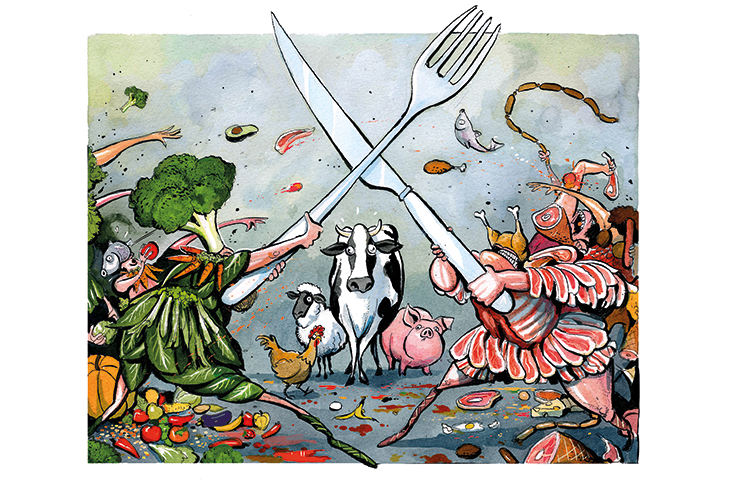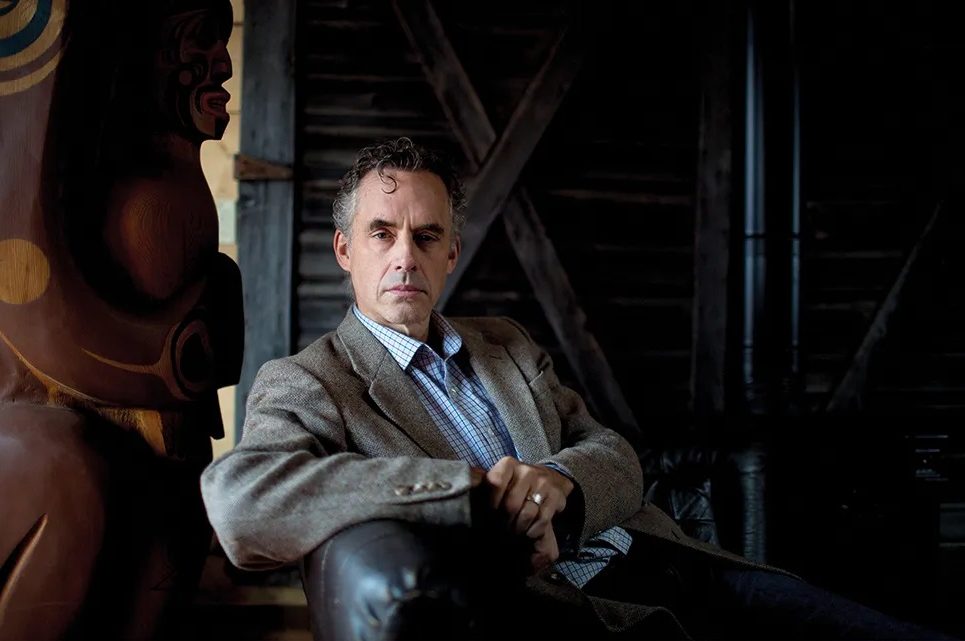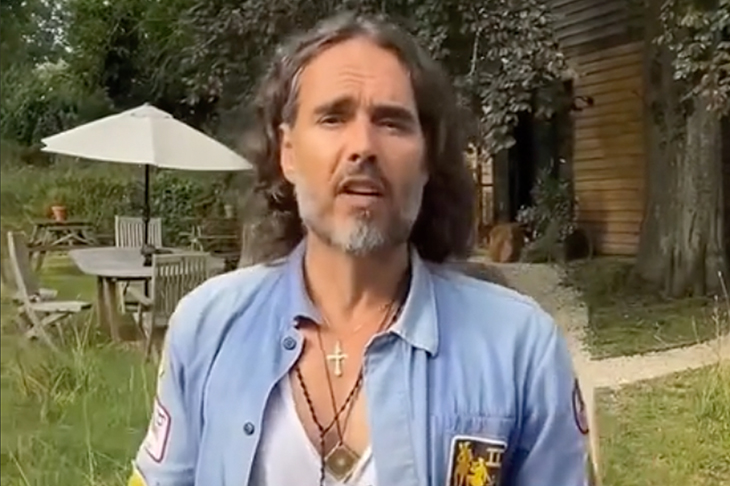As January — the month of penitence and tax returns — grinds towards its close, it would be foolish to imagine we can go back to a life of thoughtlessly eating, drinking and making merry. Dry January might give way to Wet February, as grateful drinkers furtively crack open the rioja, but the intense passions aroused by Veganuary now seem set to continue all year round.
Veganism — the shunning of meat, fish and all dairy products — was once regarded as a harmless but inconvenient hobby. Vegans got used to the mild panic they triggered at other people’s houses if the host hadn’t been pre-warned: the alarmed mouthing of ‘They’re vegan’ and the desperate rooting in the fridge for something, anything. They were humble and apologetic as they tucked into odd, hastily composed little meals of oven chips, hummus and those mushrooms found at the back of the vegetable drawer.
Back then, carnivores and herbivores rubbed along peaceably enough on the dietary savannah, with the carnivores, secure in their status as the meat-eating majority, often clumsily accommodating the herbivores’ dietary requirements while reserving the right to bore them with ‘humorous’ barbs about Hitler being a vegetarian. Now tension is growing between the two camps, with each thinking the worst of the other.
A decisive volley in the Food Wars was fired last autumn when a British food magazine editor, William Sitwell, responded to a pitch from Selene Nelson, a vegan food writer, in a style that was perhaps meant to be comic but came across as oddly snippy: ‘How about a series on killing vegans, one by one? Ways to trap them? How to interrogate them properly? Expose their hypocrisy?’ He followed it with another email, saying: ‘I like the idea of a column called The Honest Vegan; a millennial’s diary of earnest endeavor and bacon sandwiches…’
The gist of the ‘joke’ seemed to be that vegans were primarily piety-hounds who sneakily betrayed their core beliefs. It went down about as well as a hog roast at a Morrissey concert. Nelson made the email public, and Sitwell — who had, in fairness, once produced an exclusively vegetarian issue — was fired. The chain had recently expanded into the vegan market, stocking plant-based sausages and quinoa burgers, and was eager not to offend its new customer base: the swelling army of vegans finally had consumer clout. According to the Vegan Society, demand for meat-free food increased by 987 percent in 2017, and it appears to have only accelerated thereafter.
Remember when carnivores had the cultural capital, when there was no greater indicator of a man’s mastery of his own existence than the weight of his lightly bloody steak — apart from, perhaps, the size of his car? Back then, everyone aspired to be the lion and not the antelope. Meat-eaters moved confidently and recklessly through the world, handling and generating money, seizing and consuming things: cattle, resources, ideas, land, fossil fuels. Who can imagine Don Draper from Mad Men saying to the waiter: ‘And I’ll have the stir-fried tofu with the courgetti spirals’?
Meat sneaked into political slogans. In the 1980s, Democratic candidate Walter Mondale borrowed a slogan from Wendy’s burger bar to taunt his political rival Gary Hart: ‘Where’s the beef?’ When Jane Fonda and Ted Turner were the power couple of the 1990s, Turner’s environmentalism and carnivorous propensities went together. He cultivated herds of bison — once hunted to the edge of extinction — on his ranches, while Fonda and he vigorously evangelized for eating their lean, protein-heavy meat.
Today, celebrities from Benedict Cumberbatch (named the animal rights group Peta’s Most Beautiful Vegan in 2018) to Beyoncé and Bill Clinton are flocking to ‘plant-based’ diets for reasons that include animal cruelty, climate change and health.
An accumulation of grim stories has given meat and dairy consumption a bad press. For decades now, there has been an undercurrent of guilt about the frequently appalling treatment of animals in industrial farming, something which the majority of carnivores simply choose not to think about, although some now pay closer attention to the provenance of their meat. A series of documentaries have infiltrated meat-eaters’ defenses on other fronts, from Super Size Me, in which the comedian Morgan Spurlock literally sickened himself on a McDonald’s diet, to Cowspiracy, which examined the negative effect ‘animal agriculture’ has on the environment (though its original claim that 51 percent of greenhouse gases are caused by animal agriculture has been subsequently revised down to 15 percent).
The intensive farming of meat has been closely linked to deforestation, pollution and the extinction of other animals, as well as the mass production of methane — a ‘greenhouse gas’ — by cattle. Studies also indicate that the frequent consumption of red meat, particularly processed meat such as bacon, may increase the risk of bowel cancer. Sometimes, however, there is a more positive effect if animal husbandry is carried out with organic feed and without the heavy use of antibiotics: grazing livestock in low numbers enrich topsoil with their dung — and ‘soil loss’ is a serious environmental problem.
What most of us want is a middle way. The new ‘planetary health diet’, devised by 37 scientists convened by the Lancet, sought to tackle the question of how to feed a projected global population of ten billion without breaking the planet: it came up with a largely plant-based diet, which allows for one beefburger, two servings of fish and a couple of eggs a week. For meat-eaters, it offered the possibility of a ‘flexitarian’ compromise: eat less meat, but of better quality, and from animals raised more humanely. Even so, it requires a seismic shift in behavior: in 2016 people in North America ate more than six times the amount of red meat that is recommended.
Neither is it the path espoused by vegan activists for whom meat really is murder. Last year the Berkeley branch of the organic supermarket Whole Foods took out a restraining order against members of the group Direct Action Everywhere, which advocates ‘total animal liberation’ and has staged an elaborate funeral for a chicken in a Whole Foods store, complete with tearful mourners. Veganism is rapidly becoming, like so much else, a ‘cultural signifier’, and meat-eating is being linked, with growing vociferousness, to notions of ‘toxic masculinity’. It is perhaps no coincidence that the Canadian psychologist Jordan Peterson, the most vocal opponent of those who demonize ‘traditional’ maleness, now eats an all-meat diet.
In contrast, woke blokes are rapidly turning vegan, with steak-eating being seen as, well, just a bit Trumpy. Peta has recently sought to rebrand veganism as sexy, with an ad featuring men prancing around waggling fake genitals constructed out of fruit and veg. It used to be said that ‘real men don’t eat quiche’ — and now they really don’t because it contains milk and eggs, obtained through systems of inter-species oppression.
Modern life seems increasingly to entail a slow trudge through various forms of guilt towards the inevitability of death. Although I’m a meat-eater, I’ve long felt that herbivores have a superior moral argument: when alternative foods are available, why eat other sentient beings? And on every other front, it makes sense to reduce red meat consumption. But if veganism becomes too blunt a weapon in ‘identity politics’, I fear it will backfire. Still, no matter what plants they’re guzzling, the vegans are on the march: they’re sprouting muscles, and their teeth are getting sharper.
This article was originally published in The Spectator magazine.

























